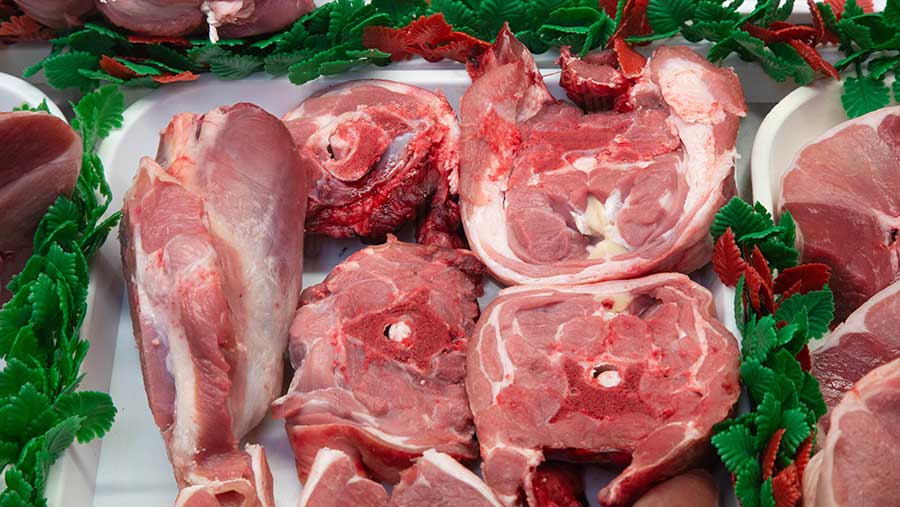Aldi drops UK lamb pledge amid mixed support from retailers
 © Tim Scrivener
© Tim Scrivener Aldi’s decision to break a longstanding pledge to stock only fresh British lamb in its British stores has been strongly criticised by industry.
The retailer will now also stock some lamb products imported from New Zealand.
The announcement comes as farmgate prices for lamb are under pressure, with GB prices down by 13% compared to the same week last year.
See also: Cost of living puts pressure on farmgate prices in 2023
The UK has an ample supply of lamb, with a large carryover into 2023, and AHDB has forecast UK lamb production to be about 8% to 9% higher than the previous year.
NFU president Minette Batters said it was disappointing to see Aldi step back from its 100% commitment to British lamb.
“Consumers now want to be able to buy local, they are recognising the challenges of climate change and everybody that we are speaking to in the world of retail appreciates that buying British is incredibly important,” said Ms Batters.
“This is all about the cost of living and all about price. We know the frozen New Zealand lamb that has come onto the market has affected price.”
An Aldi spokesperson said: “Aldi is a major supporter of British farming and we have committed to invest an additional £3.5bn a year with British suppliers by the end of 2025. This move aims to support customers during the cost-of-living crisis by offering affordable and in-season lamb all year round. British lamb will still be available at Aldi and the majority of lamb sold by Aldi will continue to be reared on British farms.”
Supermarket commitment
Farmers Weekly contacted all the major UK supermarkets to determine their current commitments for selling British meat.
Morrisons, Waitrose, and the Co-op are leading the way in backing British, with 100% commitments in place for all fresh meat.
A spokesman for Morrisons said: “At Morrisons; we are proud supporters of British farming and have sold 100% British fresh lamb, beef, and pork to customers for many years now. Being vertically integrated as we are, we can also supply many of our-own brand frozen lines too.”
The Co-op continues to stock 100% British fresh meat and 100% British meat in its own-brand frozen products.
Fresh and frozen meat at Waitrose is 100% British, with the minor exception of authentic continental meats, such as chorizo.
A Waitrose spokesman said: “We are proud that our own-label meat is 100% British – across fresh and frozen, even in our Essential Waitrose range. We’ll never compromise on our high quality, industry-leading animal welfare standards and support for our brilliant farmers.”
Tesco’s sausages, chicken, eggs, butter, milk, and cream are all British, as well as its Finest ranges for lamb and pork cuts. However, the retailer also stocks New Zealand lamb.
All beef supplied by the retailer is sourced from the UK or Republic of Ireland.
“We are proud champions of British agriculture and continue to work with our suppliers to respond to industry challenges and ensure we are able to offer customers a wide range of great value, excellent quality British products,” said a Tesco spokesman.
Sainsbury’s confirmed that all its beef is either British or Irish, and its Taste the Difference and SO Organic ranges for beef and lamb are solely British.
The supermarket chain said it is committed to sourcing British lamb and works with more than 5,000 British farmers, but there are times when it will source from New Zealand to “continue to meet customer demand while offering the best possible value.”
Sainsbury’s pork is also British, with the exception of some bacon which is sourced from the EU.
Lidl and Asda did not respond.
Outlook for UK lamb imports in 2023
New Zealand is expected to have less product available for export this year, according to the latest AHDB Agri-market outlook.
However, a weaker New Zealand dollar against the pound and Euro will increase its export competitiveness in the UK and EU.
Lamb production in Australia is forecast to grow, leaving a larger exportable surplus.
“Overall, assuming that New Zealand/Chinese trade flows remain stable, UK sheep meat imports are expected to decline slightly year-on-year, by 5%,” said the outlook.
